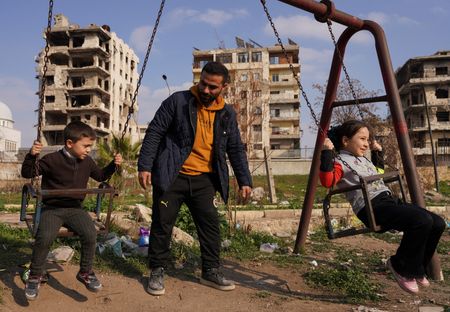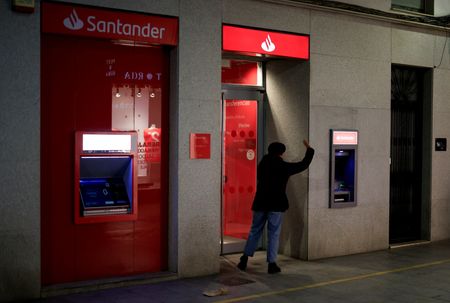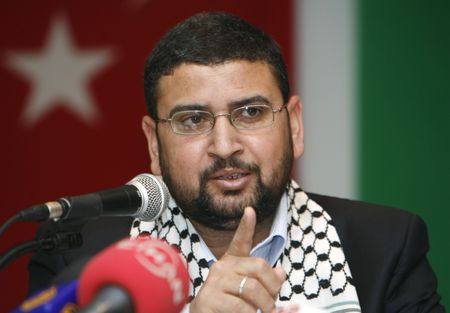By Nelson Renteria and Raul Cortes
SAN SALVADOR (Reuters) – On Monday, U.S. Secretary of State Marco Rubio announced during a visit to El Salvador that Salvadoran President Nayib Bukele has offered to incarcerate criminals deported from the U.S. in the Central American country’s CECOT mega-prison.
The offer, which Rubio later described as “very generous,” did not go into much detail, but could include taking in members of the notorious Venezuelan gang, Tren de Aragua.
Bukele expressed his willingness to accept even American inmates although U.S. citizens cannot legally be deported from the United States.
Here is what we know about the mega-prison, that has drawn praise from hardline law-and-order politicians and ire from human rights organizations.
WHO IS BUKELE AND WHAT DOES HE REPRESENT?
President Bukele, who labels himself as the “coolest dictator” and a “philosopher king,” has built election success and immense popularity on an extreme security policy to combat gang violence in El Salvador, incarcerating large quantities of alleged gang members and securing a massive drop in homicides.
In March 2022, Bukele, a 43-year-old of Palestinian descent, declared a state of emergency which remains in effect, leading to the arrest of over 84,000 individuals by state security forces. Justice and Security Minister Gustavo Villatoro has said the country is looking to make an additional 8,000 arrests.
Civil society organizations and advocates have reported over 6,000 human rights violations including arbitrary detentions, torture, due process violations, enforced disappearances, and 366 deaths within state custody. The government denies the allegations.
Away from his controversial security policies, Bukele gained fame for endorsing a law in 2021 declaring Bitcoin as legal tender in El Salvador alongside the U.S. dollar – the first country to do so.
WHAT IS THE CECOT PRISON?
In February 2023, Salvadoran authorities launched what they claim to be “Latin America’s biggest prison.” The Terrorism Confinement Center (CECOT), a 57-acre (23-hectare) “mega-prison”, is located 70 km (43.5 miles) east of the capital, San Salvador, in a rural region of the Tecoluca district.
The facility, intentionally isolated from urban areas, can accommodate up to 40,000 inmates, including leaders and members of the criminal gangs, particularly Mara Salvatrucha (MS-13) and its rival, Barrio 18. As of August 2024, the prison housed 14,500 inmates, according to government reports.
During an official visit to Costa Rica in November last year, Bukele disclosed that the land purchase, construction, and equipment had cost $115 million. The identity of the construction company or companies remains undisclosed, but an investigation by local media Voz Publica revealed that a single business group had received 14 of the 30 contracts tendered.
WHY IS THE PRISON SO CONTROVERSIAL?
CECOT has attracted global attention, both positive and negative. Argentine Security Minister Patricia Bullrich praised the facility in a June 2024 post, stating, “This is the way. Tough on criminals.”
A U.S. Republican Party delegation from the House of Representatives, led by then Congressman Matt Gaetz, visited the prison a month later.
Several YouTubers, including Luisito Comunica from Mexico, Lethal Crysis from Spain, and Araya Vlogs from Costa Rica, have generated millions of views for their prison visit videos, highlighting the prison’s harsh conditions.
Many human rights organizations have come out against the center and Bukele’s security policy more broadly.
A report from the Inter-American Commission on Human Rights (IACHR), published in September 2024, warned that the number of inmates at the prison was much higher than the latest official figures released and that overcrowding could reach 133%. They concluded that each inmate had an average space of 0.60 sq meters (6.45 sq feet), a violation of international standards.
Data from the World Prison Brief (WPB) says El Salvador has per capita the highest prison population rate of anywhere in the world, with 1,659 inmates per 100,000 residents.
(Reporting by Nelson Renteria in San Salvador and Raul Cortes in Mexico City; Editing by Sandra Maler)









